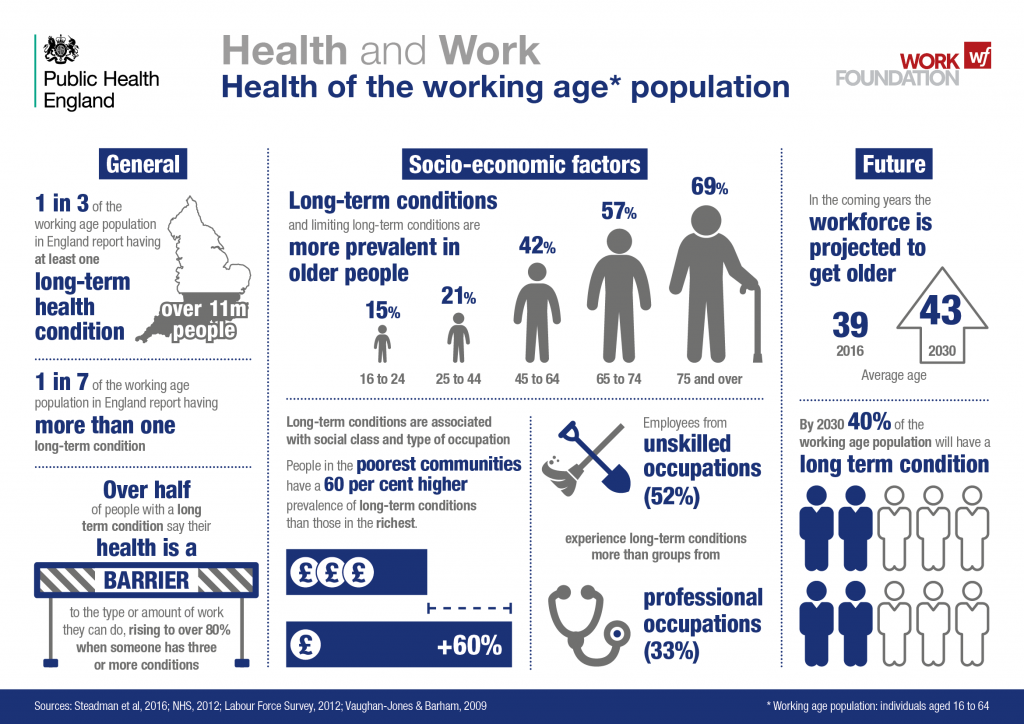We know how hard businesses like yours are working to reopen after lockdown.
You’re probably transitioning your staff back into work and getting your business back up and running as safely as possible. But have you considered support for staff with health conditions? Especially staff shielding from Coronavirus?
Public Health England found that one in three workers in England report having at least one long-term health condition like cancer, arthritis, diabetes or a mental health disorder. That’s over 11 million people.
Over half of those say their health is a barrier to their work and/or live in England’s poorest communities.
With an ageing population, these numbers are rising. Cornwall is one of the most remote regions in the country, with a higher percentage of people over 50, so extra support makes a huge impact.
As a small business in Cornwall, some of your staff could benefit from your willingness to adapt around their long-term health conditions – both the ones you know about, and the ones you don’t!
Now is a good time to check in with your employees and ask them what support they need. With some reasonable adjustments in place, you can help to reassure and retain your loyal and most experienced staff. This will benefit them and your business.

Why support staff with health conditions?
Sue Hook, Director of Client Development at Sapience HR, explains that it’s beneficial to support staff with long term health conditions. She says it brings a breadth and distinctiveness of experiences to your small business.
However, as found in our recent survey in partnership with disAbility Cornwall, people are increasingly more vulnerable due to Coronavirus, placing people further off the radar to employers and out in the community.
Sue explains:
“More people could be impacted and have their health affected by Coronavirus, both in the short and the long term. Yet there’s now the potential for employers to be more flexible in how they deal with staff with health issues. The mould is broken in that flexible working is much more acceptable. But for many small businesses who don’t have trained human resources staff, extra support measures may get overlooked.”

Can you have honest conversations about health?
Sue recommends:
“Discussing everything more than once to keep the dialogue open. Listen to your staff about what they can and cannot do, and ask them about their preferences. Your staff are individuals, so it may be different for each person. Try your best – within commercial viabilities – to be able to meet their individual needs.
“Privacy can be an issue. Staff not wishing to share personal information about their health issues or disabilities is perfectly understandable. It is only necessary for them to share what impacts on their work. Anything else is their choice.”
How can managers support staff with their health?
Line managers play a vital role in small businesses without trained HR staff, or where hiring is done directly by the business owner. Your managers could make the difference between retaining and losing vulnerable and valuable staff members.
Sue says:
“You should make sure your managers are aware of your responsibilities as a business to support staff with their health and wellbeing. Share government guidelines and maximise the training and support available. Use networks in Cornwall and independent human resources consultants like ourselves.”
How can you decide what adjustments to make?
The Equality and Human Rights Commission provides guidance for employers making reasonable adjustments, to help you remove or reduce any disadvantages for staff. They can differ from person to person and from business to business.
Sue says:
“There are some essentials to cover for home and remote working. For example agreeing on ways of working, decision-making, patterns of regular contact by email, phone or video, and discussing preferences for regular face to face contact with line managers.
“You should provide access to databases and documents as required. Provide risk assessments of people’s working environments to provide suitable equipment – especially for disabled staff who may need specialist equipment.”
How do adjustments work in practice?
Catherine Thomas, the HR Manager from China Fleet Country Club, is experienced at supporting employees with new or existing health conditions.
Catherine said:
“We always consult with people and support them while making reasonable adjustments wherever we can. Sometimes that’s as simple as changing somebody’s working hours”.
Watch the video to hear from Matthew Richards who has a long-term health condition and works at China Fleet. He explains how these adjustments helped him to phase back into work following major surgery.
We hope you’ve found this information helpful as you support and manage your vulnerable staff during safely back into work.
For more guidance and helpful resources please sign up to our newsletter.
Have you already signed up to our newsletter…?

When you sign up, you get a free exclusive 10-minute video training, The Five Workforce Trends Every Small Business Should Know About, as well as getting a summary of the same info in time-saving, easy-to-digest infographic format.

